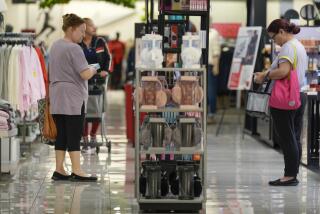Housing Spurt Seen as Sign That Recession Is Ending
- Share via
WASHINGTON — The first, halting signs that the worst of the recession may be over emerged Tuesday, when the Commerce Department reported that, in February, housing starts showed their biggest gain in a year, rising a surprisingly sharp 16.4%.
Coupled with newly released data that shows consumer confidence is rebounding rapidly in the wake of America’s quick victory in the Persian Gulf War, the housing report convinced leading economists around the nation that an economic recovery may be in sight.
“This (housing report) is a tentative piece of evidence that the recession is over,” said Jerry Jordan, chief economist at First Interstate Bank in Los Angeles. “I think people will eventually agree that the recession ended in February.”
“I don’t know if the recovery has started yet, but I think we probably have hit bottom,” added Lawrence Kudlow, an economist and senior managing director at Bear Stearns in New York.
The Bush Administration also seized on the housing figures as “encouraging early statistics” that suggested that the recession was nearing an end.
“The dramatic increase in housing . . . hopefully bodes well for a recovery,” White House Press Secretary Marlin Fitzwater said Tuesday.
The government reported Tuesday that new homes and apartments were started by builders at a seasonally adjusted annual rate of 989,000 units, up from an anemic 850,000 annual rate in January. The February gain was the largest increase since January, 1990, before the current recession began.
“We think that this is the start of a genuine upturn in housing and the rest of the economy,” said David Raleigh, an economist with DRI-McGraw Hill, an economic forecasting firm in Lexington, Mass. “We think this shows that January was the bottom of the housing market.”
Most of the new strength in housing showed up in the Midwest and South, with the Northeast and the West still weak, analysts said.
Raleigh and other analysts said that low interest rates and falling real estate prices finally had an impact in February on the sluggish housing market, which previously had been one of the weakest sectors in the economy. There is mounting anecdotal evidence from builders and realtors around the nation that more shoppers are looking at homes for sale and that houses are no longer sitting as long waiting to be sold.
Now, with the Gulf War over, many economists believe that a quick recovery in consumer and business confidence will lead to even greater gains in housing in March, with other industries following its upturn soon after.
“I think we have bottomed out in housing, and, if we get a turnaround like this in auto sales soon, then the recession is over,” Raleigh said.
Initial surveys show that consumer confidence already is moving up from the unprecedented drops suffered during the Persian Gulf crisis.
In an unusual interim report, the University of Michigan’s Institute for Social Research said this week that its consumer confidence index jumped to 88% in early March from 70.4% in February, bringing the index back almost to the levels posted prior to Iraq’s invasion of Kuwait last August.
“We are getting some euphoria after the war, and so I think we’ll be getting some bounce at least in some areas of the economy,” Philadelphia economic consultant Lawrence Chimerine observed.
With the recession apparently winding down, economists began to turn their attention once again to inflation, which, the Labor Department reported Tuesday, remained stubbornly high in February. Inflation at the consumer level rose a modest 0.2% during the month, but that rate was kept artificially low by a decline in oil prices in the wake of the Gulf War. The core rate of inflation, which excludes food and energy, rose 0.7%, after a 0.8% increase in January.
That relatively high rate of inflation convinced Wall Street and many economists that the Federal Reserve Board no longer has the flexibility to cut interest rates much further.
The Fed’s policy-setting Federal Open Market Committee meets next week to determine the course of interest rates for the spring, and economists said Tuesday they believe that the central bank will shy away from making any significant moves.
Further rate cuts would renew fears of higher inflation in the financial markets, which dropped sharply Tuesday, partly in response to the inflation report. The Dow Jones Industrial Average fell 62.13 points on Tuesday, to 2,867.82, the largest drop in the index since a 78.22-point decline last October.
In addition, some economists cautioned that it is still too early to tell just how soon the economic recovery will begin.
“I think real estate is a good indicator, but we have had such weak numbers in employment and industrial production in the last few months that I would like to see some turnaround there before I say the recovery has started,” Kudlow warned.
THE ECONOMY
Construction of new homes and apartments posted its biggest monthly gain in more than a year; inflation, meanwhile, was moderate overall but it heated up in some key areas. THE CHANGES Energy prices: Down sharply Food prices: Down slightly Clothing prices: Up sharply Housing starts: Up sharply Building permits: Up sharply
WHAT DOES IT MEAN?
* Recession: A rebound from the housing slump, if it continues, could shorten the downturn.
* Inflation: The price increases for new cars, clothing and other items surprised and disappointed some economists.
* Interest Rates: With inflation still a worry, the Federal Reserve may hesitate to cut rates further.
Sources: Housing Starts; Building Permits; consumer price index, a measure of retail inflation.
More to Read
Inside the business of entertainment
The Wide Shot brings you news, analysis and insights on everything from streaming wars to production — and what it all means for the future.
You may occasionally receive promotional content from the Los Angeles Times.










